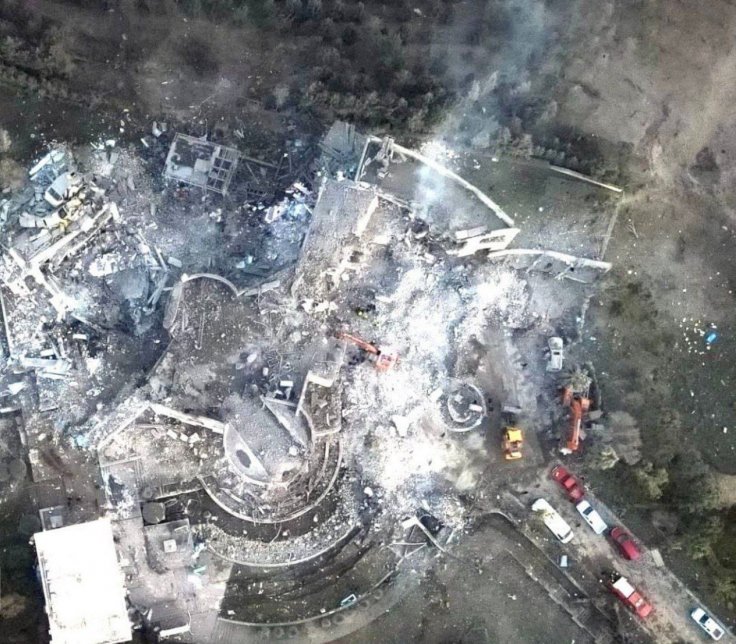Iran launched a missile strike late Tuesday, targeting two Israeli military bases and the headquarters of Israel's intelligence agency, Mossad. The attack, which involved the use of ballistic missiles, was confirmed by Iranian state television and announced by Mohammad Bagheri, Iran's top military officer.
The missile strike followed Israeli ground raids into Lebanon, marking a significant escalation in regional conflict. This is the most intense military confrontation since the fighting in Gaza last year.
According to the Tehran Times, the Nevatim airbase, which houses Israel's F-35 fighter jets, was one of the key targets. The report claimed that jets from this base were used in airstrikes on Beirut on September 27. Iran's Islamic Revolution Guard Corps (IRGC) used hypersonic Fatah missiles to target Nevatim and other military installations in southern Israel.
Iranian state media further reported that several rockets hit the Nevatim base, located in Israel's Negev desert. This is the second known attack on the base, following a previous strike on April 13. Although Israeli officials acknowledged the missile strike, they downplayed the impact, stating that the damage was minimal.
In a statement to the press, Iranian Armed Forces Chief of Staff Mohammad Bagheri confirmed that the Nevatim airbase, the Netzarim military facility, and the Tel Nof intelligence center were hit in what Iran called "Operation True Promise II."
Iran claims the missile strikes were retaliation for several recent high-profile assassinations. These included the July 31 killing of Hamas leader Ismail Haniyah, IRGC commander Abbas Nilforoushan, and the September 27 killing of Hezbollah leader Sayyed Hassan Nasrallah in Beirut. Bagheri stated that while military targets were hit, civilian areas were deliberately spared in the attack.

Israeli Response and U.S. Involvement
In response, Israeli Prime Minister Benjamin Netanyahu condemned the attack and vowed retaliation. "Iran made a big mistake today and will pay for it," Netanyahu said in a televised address. "The Iranian regime does not understand our resolve to defend ourselves and seek vengeance against our enemies."
Israel's military reported intercepting most of the missiles, with minimal damage to infrastructure. However, videos circulating on social media showed large craters near Mossad's headquarters, with reports of one crater measuring 30 feet deep and 50 feet wide. The footage has sparked concerns over the extent of the damage.
U.S. Secretary of Defense Lloyd J. Austin III issued a statement supporting Israel and condemning Iran's actions. He labeled the missile attack "an outrageous act of aggression" and confirmed that U.S. forces assisted Israel in intercepting the missiles. Austin also stressed that American troops remain prepared to defend U.S. interests and support Israel in the ongoing conflict.
Iran's Justification
Iranian President Masoud Pezeshkian defended the missile strikes as a legitimate response to ongoing attacks on Iranian interests and allies in the region. In a post on social media platform X, Pezeshkian emphasized that the operation was aimed at safeguarding Iran's citizens and ensuring stability in the region. He framed the attack as part of Iran's right to self-defense.
Celebrations erupted across several cities in Iran following the missile strikes. Crowds carrying Iranian, Lebanese, and Palestinian flags gathered in public squares, expressing solidarity with the IRGC and praising the successful targeting of Israeli military facilities.
Escalating Tensions in the Region
The missile strike has intensified already volatile tensions in the Middle East. In a related development, U.S. Central Command announced that it would deploy additional fighter squadrons to the region. Three squadrons of F-16, F-15E, and A-10 aircraft are expected to arrive soon, with one already in position. This move signals a potential build-up of U.S. military presence as the situation continues to unfold.
With both sides trading threats, the conflict shows no signs of de-escalation. Regional experts fear that the violence could spill over into neighboring countries, drawing more actors into the fray. While Israel and the U.S. strengthen their defenses, Iran remains defiant, continuing its missile campaign in what it describes as a quest for regional stability and security.
As the conflict escalates, the international community watches closely, bracing for the next chapter in this unfolding crisis.









